Sark Datestones
- Introduction
In 1563 the uninhabited Island of Sark was granted to the Seigneur of St
Ouen (Jersey), Helier de Carteret, who had offered to take on the
defence of the island, which was in danger of becoming occupied by the
French. In 1565 Helier, his wife Margaret and a number of their St Ouen
tenants, moved to Sark and began a settlement, bringing everything they
needed with them. He was obliged to ensure that the Island would never
again become depopulated and could be defended by at least forty men (a
quarantine). He parcelled out leased land at a low rental, made large enough
to support a family, on condition that a house was put up and the tenant
provided one man, armed with a musket and ammunition, to defend the island
if necessary.
Helier reserved one sixth of Sark for himself and built his house (Le Manoir).
To repay a debt to the Gosselin family of Guernsey, he let them
have the second largest site on the Island (Beauregard) on condition they
provided four men and paid a rent set at 50 shillings. Gosselin brought
the Vaudin and Du Val families and subleased some of his
land to them. Other parcels went to those who had accompanied Helier -
their surnames were Le Cerf, Vibert, Chevalier, Le
Brocq, Le Couteur, Rogier and Guille from St Ouen,
Poingdestre and Hamon from St Saviour, Le Masurier
and Le Gros
from Trinity. Later arrivals came from St John (Hotton), the Alexandres
came from St Peter and a few English folk with vital skills joined them
- Smith, Dare, Brayer, Slowley and Roo.
- Dated Stones
-
- As the infrasructure of the Island grew, several vital projects were
marked by datestones.
 The Mill has L'An 1571 carved over the lintel.
The Mill has L'An 1571 carved over the lintel.
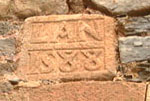 The first tunnel, carved from the rock of Le Creux
Harbour, is surrounded by a traditional Jersey arch with the L'An
1588 above.
The first tunnel, carved from the rock of Le Creux
Harbour, is surrounded by a traditional Jersey arch with the L'An
1588 above.
 At Le Manoir is a window lintel dated 1600 and
the de Carteret Coat of Arms appears on a corbel on the left hand side
of the roof.
At Le Manoir is a window lintel dated 1600 and
the de Carteret Coat of Arms appears on a corbel on the left hand side
of the roof.
 St Peter's Church is dated 1820.
St Peter's Church is dated 1820.
-
- Much later, a warehouse at the top of Harbour Hill was built and a
stone dated 1893 was erected over the door. The premises is now used by
the Sark Electric Company who added a dated extension in 1953. When
German Prisoners of War repaired La Coupee (the crossing to Little Sark)
they left behind a stone dated 1945.
- Initialled Stones:
-
- An architectural feature of a few old Sark houses, sometimes referred
to as Marriage Stones. The initials of husband and wife and a date were
often carved on a piece of granite and used as a lintel above the front
door or a plaque one storey up, when the house was enlarged. However, these
stones rarely commemorate a marriage but usually mark the inheritance,
construction or alternation of a building.
-
 Beau Regard, Le Grand Beauregard Tenement
Beau Regard, Le Grand Beauregard Tenement
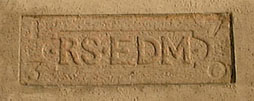 RS EDM1730 Robert Slowley and Elizabeth Du Maresq m. (Sark) 16.1.1716/7.
RS EDM1730 Robert Slowley and Elizabeth Du Maresq m. (Sark) 16.1.1716/7.
 WF MB Rebuilt 1894. William Falle and Marie Ann Bichard.
WF MB Rebuilt 1894. William Falle and Marie Ann Bichard.
 Clos de Dixcart Tenement, Dixcart Lane
Clos de Dixcart Tenement, Dixcart Lane
 PDM 1741. Philippe Du Maresq fils Philippe Du Maresq,
who held the tenement on the 1675 Liste des Tenants. Stocks Hotel -
formerly Clos de Dixcart.
PDM 1741. Philippe Du Maresq fils Philippe Du Maresq,
who held the tenement on the 1675 Liste des Tenants. Stocks Hotel -
formerly Clos de Dixcart.
 TG 1895. Thomas Godfray bought the tenement from Pierre
Le Pelley 10.6.1853. Stocks Hotel.
TG 1895. Thomas Godfray bought the tenement from Pierre
Le Pelley 10.6.1853. Stocks Hotel.
 HLM.ELM 1791 Henry Le Masurier & Elizabeth Le Masurier
m. (Sark) 8.8.1782.Le Grand Dixcart.
HLM.ELM 1791 Henry Le Masurier & Elizabeth Le Masurier
m. (Sark) 8.8.1782.Le Grand Dixcart.
- PGW.REW 1941 Percy George Woolford and Rosina Elizabeth Woolford married
in London in 1941. This marriage stone was erected over a new door when
the dower wing was built in 1999. Le Grand Dixcart.
 La Moinerie Tenement
La Moinerie Tenement
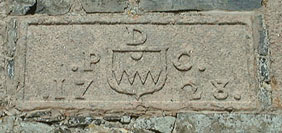 PDC 1728 and de Carteret Coat of Arms. Philippe de Carteret (fils
Philippe fils Helier).
PDC 1728 and de Carteret Coat of Arms. Philippe de Carteret (fils
Philippe fils Helier).
 Little Sark
Little Sark
 PHM (entwined hearts) EHM 1762. Pierre Hamon (Sark)
& Elizabeth Hamon (Jersey) m. (Sark) 29.7.1749. Over a window at the
rear of La Moiserie, heavily painted over.
PHM (entwined hearts) EHM 1762. Pierre Hamon (Sark)
& Elizabeth Hamon (Jersey) m. (Sark) 29.7.1749. Over a window at the
rear of La Moiserie, heavily painted over.
 La Ville Tenement
La Ville Tenement
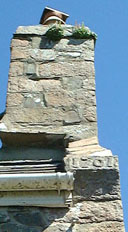 PDC MDC 1707. Corbel on right of the roof. Philippe
de Carteret (Sark ) & Marie de Carteret (Jersey) m. (St L) 2.3.1698/9.
La Ville Farm.
PDC MDC 1707. Corbel on right of the roof. Philippe
de Carteret (Sark ) & Marie de Carteret (Jersey) m. (St L) 2.3.1698/9.
La Ville Farm.
 Landless Men
Landless Men
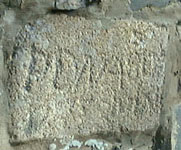 PDN.EG 1782 Philippe Denize & Elizabeth Guille m. (Sark) 10.3.1780.
La Rue, La Rue Rade. Rough cut stone on the barn, belonging to an older
house on the site demolished in 1968.
PDN.EG 1782 Philippe Denize & Elizabeth Guille m. (Sark) 10.3.1780.
La Rue, La Rue Rade. Rough cut stone on the barn, belonging to an older
house on the site demolished in 1968.
- Updates will appear at New
Items and Updates | Links: Jersey
Datestones | Guernsey
Datestones | Channel
Islands Introduction Page | Research in the
Channel Islands FAQs | Alex
Glendinning's Home Page
 The Mill has L'An 1571 carved over the lintel.
The Mill has L'An 1571 carved over the lintel.
 St Peter's Church is dated 1820.
St Peter's Church is dated 1820.
 PDM 1741. Philippe Du Maresq fils Philippe Du Maresq,
who held the tenement on the 1675 Liste des Tenants. Stocks Hotel -
formerly Clos de Dixcart.
PDM 1741. Philippe Du Maresq fils Philippe Du Maresq,
who held the tenement on the 1675 Liste des Tenants. Stocks Hotel -
formerly Clos de Dixcart.
 TG 1895. Thomas Godfray bought the tenement from Pierre
Le Pelley 10.6.1853. Stocks Hotel.
TG 1895. Thomas Godfray bought the tenement from Pierre
Le Pelley 10.6.1853. Stocks Hotel.